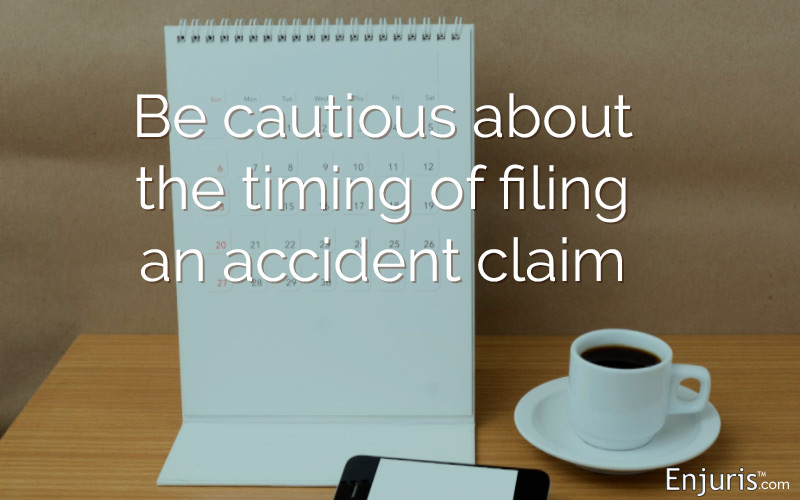Hablamos español.
The Texas statute of limitations gives you 2 years - or 6 months in some cases – but there are other issues to consider in your timing, too
The weeks following a vehicle accident or other incident can be trying, whether it happened in Texas or elsewhere.
You may be in serious pain and have difficulty even gathering your thoughts. It may not be possible to even leave the hospital. The idea of going to work will likely be out of the question.
Medical bills will start piling up. There are probably still going to be questions about who will even pay to replace your damaged car or other damaged property. (See our resources for Texas accident victims.)
There can be an immense sense of urgency during this time, but there is also a lot of reason to be cautious about the timing of filing an accident claim.
(If your injury is catastrophic, you might need more time to assess this fairly.)
How quickly should you file a personal injury claim or lawsuit in Texas?
The foremost concern you’ll have in this situation is making sure that all of your potential medical issues have been discovered.
Settling an accident claim means losing the right to seek further damages. That means you want to have a fairly high level of confidence that every single thing you need to seek compensation for has been tallied.
At the same time, the statute of limitations may be working against you.
Almost any attorney will tell you that you should never file an injury claim any sooner than it takes to fully assess the compensation that you’re due.
Tweet this
How long does the statute of limitations give you to file a personal injury suit in Texas?
In the state of Texas you are limited by law in terms of how long you can wait to submit an accident claim for, say, a car or truck accident.
Under Texas law, you typically have two years to file an injury claim. (Tex. Civ. Prac. & Rem. Code, Title 2 section 16.003). Some exceptions are noted below.
When does the Texas statute of limitations begin?
The two-year or six-months timeframe starts from the date of the incident or accident in question.
Does my entire case have to be resolved within 2 years?
Bear in mind this does not mean you need to have the matter resolved within a two-year timeframe.
It simply means that you need to have all of your paperwork filed.
That entails informing all of the parties involved in the injury claim, including the insurance company and those who you believe were responsible for your injuries, of your intent to sue and why.
Exceptions to Texas’ two year time limit
There are exceptions under Texas law.
Defective products or products liability statute of limitations
For defective products or a products liability case, the statute of limitations to file a claim is 15 years from the date of purchase.
You may have additional time in Texas if the injury had a delayed onset, or if the product manufacturer offers a longer warranty. The 15 year time limit (also called the statute of repose) has been affirmed in case law – see Burlington Northern & Santa Fe Railway Company v. Poole Chemical Company.
Suing the state of Texas
If you are intent upon pursuing an accident or injury claim against a government entity or a state employee who was working in an official capacity, you only have six months to file your claim.
You cannot simply decide to immediately pursue a personal injury lawsuit against the Texas state government.
You must first formally submit your injury claim to the unit of the Texas government that you believe was at fault. You must also detail when the incident occurred, who was involved and other particulars that might help the state respond to the claim.
Statute of limitation in workers’ compensation claims
In Texas, you have one year from the date of your injury within which to bring a workers’ compensation claim against your employer.
If it’s an occupational illness, then you have a year from the date which you learned of your illness (or should have known).
Furthermore, you must report your injury to your employer within 30 days from the date of the injury, or from the date you knew your injury or illness was related to your job. If you do not notify your employer within these 30 days, your right to obtain benefits could be lost.
Balancing the timing of your case is critical
You have the right to seek compensation for injuries you’ve sustained during an accident. The issue of timing, however, is important.
A balance needs to be struck between filing your claim or lawsuit as soon as possible and allowing enough time for doctors to fully uncover all of your injuries and potential long-term risks.
While some people do choose to go it alone, you should at least speak with a knowledgeable Texas attorney. He or she will help you handle the process in a way that allows you to better defend your legal rights and protect your financial and medical interests.
Other resources: General information on the statute of limitations.
See our guide Choosing a personal injury attorney.


